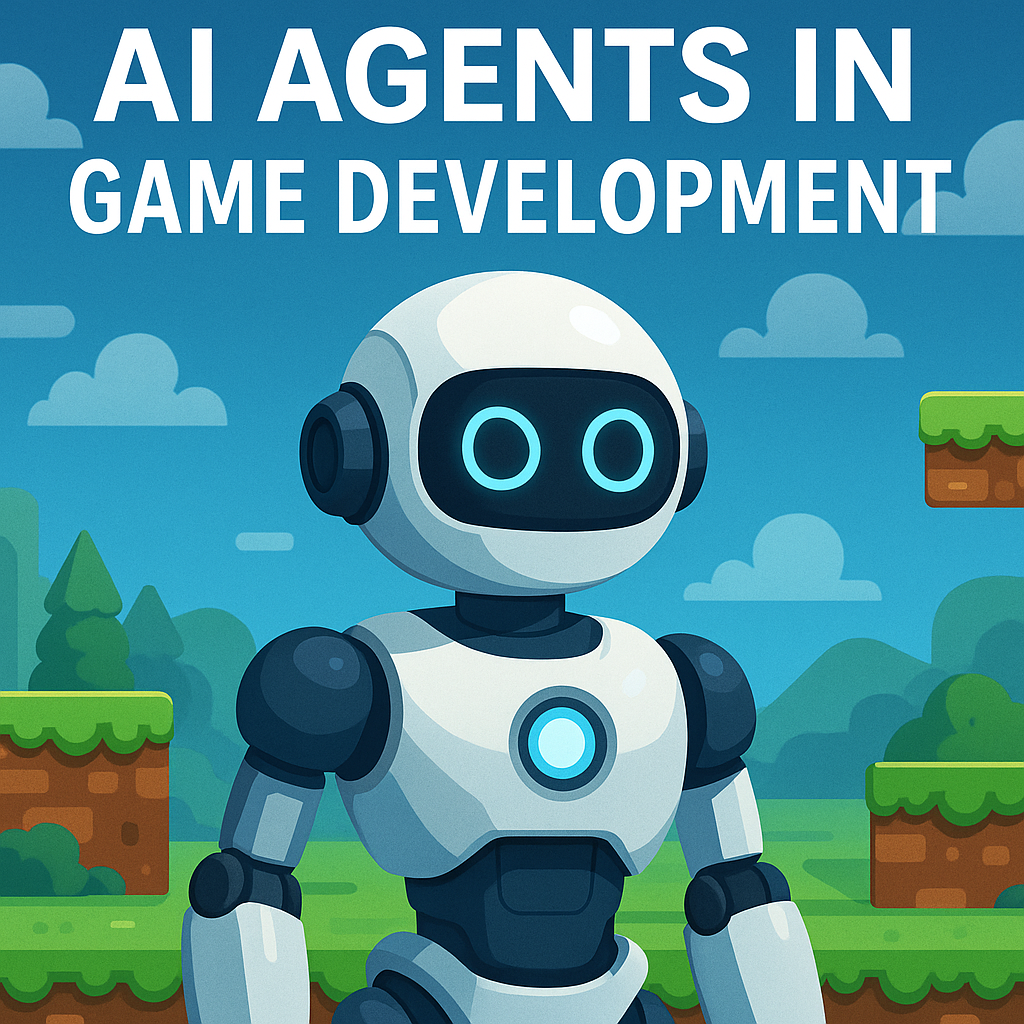Introduction
Game development has come a long way from the days of simple arcade sprites and predictable enemy patterns. Today, players expect immersive worlds, dynamic challenges, and characters that don’t just stand still waiting to be hit. That’s where AI Agents in Game Development step in—sophisticated algorithms that breathe life into pixels, making games feel more human, unpredictable, and downright exciting.
But what exactly are AI agents? And how are they reshaping the future of interactive entertainment? Buckle up, because we’re diving deep into the fascinating universe where code meets creativity, and machines start thinking like characters in your favorite RPGs.
Understanding AI Agents in Game Development
What’s an AI Agent Anyway?
An AI agent, in simple terms, is a digital entity programmed to act autonomously within a system—reacting to inputs, adapting to conditions, and sometimes even “learning” from experience. In the context of video games, AI agents can be:
- Non-playable characters (NPCs) that respond to player behavior.
- Enemies with adaptive combat strategies.
- Environmental systems, like weather that changes in reaction to gameplay.
- Procedural generators that build levels or quests on the fly.
Instead of following rigid, pre-coded paths, these agents make decisions—sometimes surprising ones—that enrich gameplay.
💡 Gear Up Tip: If you want to experience adaptive soundscapes while playing games built with AI agents, consider the HyperX Cloud III Wireless Gaming Headset. It delivers immersive 3D audio that makes AI-driven environments come alive.
The Evolution of AI in Gaming
From Pong to Open Worlds
Remember Pong? The “AI” was nothing more than a bouncing square programmed to move at a certain angle. Fast forward, and games like The Elder Scrolls: Skyrim or Grand Theft Auto V feature bustling towns filled with AI-driven NPCs going about their day. The leap has been monumental.
- Early Games (1970s–80s): Limited AI, mostly pattern-based.
- Golden Age (1990s): Smarter opponents in shooters and RTS games like StarCraft.
- Modern Era (2000s–Now): Adaptive AI, machine learning models, and procedural generation in titles such as Minecraft or No Man’s Sky.
Why the Shift Happened
Player expectations skyrocketed. Gamers didn’t want predictable enemies—they wanted foes who could flank, allies who could assist, and worlds that felt alive. Developers turned to AI Agents in Game Development to fill the gap.

How AI Agents Enhance Game Development
1. Smarter NPCs
One of the most noticeable uses of AI agents in game development is the behavior of NPCs. Gone are the days when enemies charged straight into your bullets. Now, they:
- Take cover and wait for backup.
- Learn from your strategies and counter them.
- Display emotional reactions, like fear or aggression.
👉 Pro-level players often combine such advanced AI with top-tier gear. That’s why many choose the Logitech G PRO X Wireless LIGHTSPEED Gaming Headset. It’s designed for competitive gaming where hearing AI-driven footsteps and enemy cues makes all the difference.
2. Procedural Content Generation
Games like No Man’s Sky prove that AI agents can create endless galaxies. Procedural generation means developers don’t need to handcraft every detail—agents can handle terrain, missions, and even dialogue trees.
3. Realistic Environments
Dynamic weather, changing economies, and evolving ecosystems? That’s AI at work. Imagine hunting in a forest where the prey adapts its behavior over time—suddenly, survival feels authentic.
4. Personalized Player Experiences
Through machine learning, AI Agents in Game Development can track how you play. Love sneaking around? The game adapts by creating stealth-focused missions. Prefer brute force? Expect more explosive challenges.
Benefits of AI Agents in Game Development
So, why are developers going all-in with AI agents? Let’s break it down:
- Immersion: Worlds feel alive and unpredictable.
- Replay Value: Games adapt differently each playthrough.
- Efficiency: Developers save time by letting AI handle repetitive design tasks.
- Scalability: Massive games with fewer human resources.
It’s no wonder major studios and indie developers alike are jumping on the AI train.
💡 Immersion Hack: For the ultimate experience in AI-driven VR environments, the Meta Quest 3 VR Headset takes things to another level. Imagine stepping into a virtual world where every NPC is powered by AI agents that react to your choices in real time.
Challenges and Limitations
Of course, AI agents in game development aren’t all sunshine and rainbows. Developers face some serious hurdles:
- Complexity: Designing agents that don’t break immersion is tough. Ever seen an NPC walk straight into a wall? Yeah, that’s poor AI.
- Performance: AI agents can hog processing power, slowing down gameplay.
- Predictability vs. Chaos: Too random, and the game feels unfair. Too predictable, and it feels boring.
- Ethical Concerns: What happens if AI agents get too realistic—say, showing human-like suffering? That’s a line some argue games shouldn’t cross.
Real-World Examples
The Last of Us Part II
Enemies communicate with each other, call out names, and adapt to player tactics. The AI agents here push emotional engagement to new levels.
Middle-earth: Shadow of Mordor (Nemesis System)
AI enemies remember previous encounters. That orc you barely escaped from? Next time, he’s stronger—and he remembers your face.
Minecraft
Villagers trade, mobs attack, and the environment reacts—all thanks to lightweight AI agents.
“To explore how artificial intelligence is shaping industries beyond gaming, check out this comprehensive overview from IBM on AI in technology.”
Future of AI Agents in Game Development
The future looks wild. Imagine:
- Generative AI Storylines: Entire narratives created on the fly, unique to each player.
- Hyper-Real NPCs: Characters that genuinely feel alive, with emotions and evolving personalities.
- Cross-Platform Agents: AI that follows your player across different games—like having a personal sidekick wherever you go.
We might even see AI Agents in Game Development used in VR and AR to create adaptive, lifelike characters that can blur the line between digital and real.
“If you’re curious about the latest innovations and premieres shaping the gaming world beyond AI, don’t miss our detailed coverage of the PC Gaming Show Tokyo Direct 2025.
FAQs
1. Are AI agents the same as regular game AI?
Not exactly. Traditional AI is rule-based and limited. AI agents, on the other hand, adapt, learn, and sometimes make unpredictable decisions.
2. Will AI agents replace human developers?
Nope! They’re tools, not creators. Developers still design worlds and rules—AI just enhances them.
3. Can AI agents make games harder?
Yes, but ideally in a balanced way. Adaptive AI challenges you without making things unfair.
4. What’s the coolest example of AI in gaming?
Many argue the Nemesis system in Shadow of Mordor is the gold standard, but newer titles like The Last of Us Part II are catching up.
5. Will future games be entirely AI-driven?
Unlikely. Full automation removes the artistry of human storytelling. Instead, expect hybrid models—human creativity guided by AI flexibility.
Conclusion
AI agents in game development aren’t just a passing trend—they’re redefining how we experience virtual worlds. From smarter NPCs to dynamic environments, these digital actors transform static code into living, breathing ecosystems. Sure, there are challenges like performance issues and ethical debates, but the potential far outweighs the risks.
As technology continues evolving, we’re inching closer to a reality where every playthrough feels unique, every NPC has a story, and every player finds a game tailored just for them. The future of gaming is intelligent, adaptive, and thrilling—and AI agents are at the heart of it all.
👉 Want to enhance your own gaming experience? Don’t miss out on these top picks:
- HyperX Cloud III Wireless Gaming Headset
- Logitech G PRO X Wireless LIGHTSPEED Gaming Headset
- Meta Quest 3 VR Headset
Disclaimer
This article is for informational purposes only and reflects the author’s opinions on the role of AI Agents in Game Development. While every effort has been made to ensure accuracy, readers should conduct their own research before making decisions based on this content.
Some of the links in this article are affiliate links, including those to Amazon. As an Amazon Associate, I earn from qualifying purchases at no additional cost to you. These commissions help support the website and allow us to continue creating free content.
Please note that product availability, pricing, and features may change over time. Always verify details on the seller’s page before purchasing.



Leave a Reply